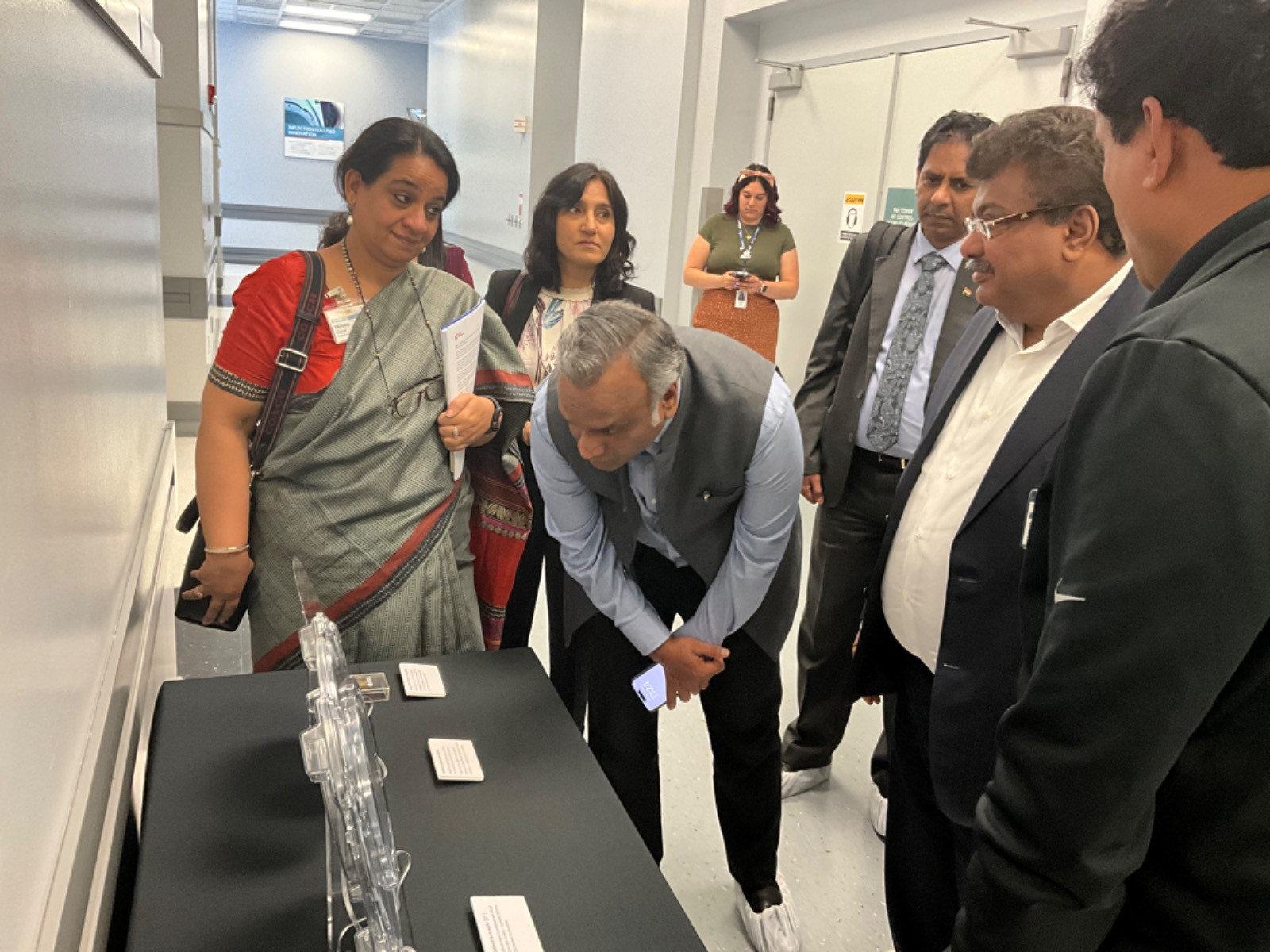California, US: Karnataka Information Technology and Biotechnology (IT/BT) and rural development and Panchayat Raj Minister Priyank Kharge along with Minister for Large & Medium Industries M B Patil held a series of meetings with industry leaders and Indian diaspora in the US recently. They interacted with executives from Applied Materials, Juniper Networks and Western Digital and discussed topics including semiconductor ecosystem, hardware manufacturing, R&D investment, ease of doing business and others.
Sharing his experience, Priyank Kharge said, “Karnataka as an IT/BT hub offers immense growth opportunities for companies. I am happy that we had fruitful interactions with industry leaders in the US and received positive feedback. Our government continues to be committed to providing the best infrastructure, ensuring ease of doing business through conducive policies.”
Meeting with Applied Materials, a software services company
Key highlights: R&D lab, CoE for innovation and skilling
Ministers Priyank Kharge and M B Patil interacted with Applied Materials executives and also visited the Maydan Technology Center, a state-of-the-art facility dedicated to advanced chip making.
Topics of discussion included:
- Government support for pre-construction approvals of the Applied Materials R&D lab in Whitefield, Bengaluru.
- Explored government restrictions on chemicals and gases, critical for the semiconductor ecosystem
- Commitment to accelerate Karnataka's ecosystem through collaboration on skilling and establishing a Center of Excellence for innovation in collaboration with the Government.
Applied Materials, a global leader in materials engineering solutions for the semiconductor, flat panel display and solar photovoltaic (PV) industries, has recently announced its intention to build a collaborative engineering center in Bengaluru with an investment of $400 mn spanning over 4 years.
Meeting with Juniper

Key highlights: R&D, CoE, renewable energy, hardware manufacturing, skill development
Ministers interacted with Juniper executives about the following topics:
Enhancement of R&D capabilities.
Exploration of hardware manufacturing in India, with discussions on the supplier ecosystem, policies, and incentives in Karnataka.
- Insights into renewable energy plans for business operations.
- Government partnership on establishing a Center of Excellence for design and wireless products by March 2024.
- CSR initiatives for skill development in rural areas.
- Collaboration on skilling and training in Data Science, AI, IoT, and cybersecurity.
Juniper Networks, an American MNC specializing in the development and marketing of networking products, has the largest data center in Karnataka, employing 4000 people and is the largest base for developers.
Meeting with Western Digital
Key highlights: Manufacturing in India, PCB and ICB ecosystem, CoE in AR/VR
Ministers interacted with the executives from Western Digital on the below topics:
- Exploration of import tariffs and the Indian regulatory landscape to ensure the financial viability of manufacturing in India.
- Discussion on customs-related issues.
- Building connections with the PCB and ICB ecosystem, seeking support in establishing partnerships.
- Collaboration proposal for a Center of Excellence (CoE) in AR/VR (augmented reality and virtual reality) and gaming accelerators.
- Exploration of ways to improve ease of doing business and expedite the approval process.
- Western Digital, a computer drive manufacturer and data storage company, has a large R&D presence in Bengaluru and the team focuses on firmware development enterprise hard Disk Drive development.
Meeting with Indiaspora
Key highlight: Call for investments in Karnataka
At a dinner meeting with 30+ members of Indiaspora, a network of global Indian origin leaders from diverse backgrounds and professions, the Ministers spoke about the vision of Karnataka along with emerging opportunities. They called upon the entrepreneurs, business owners, and innovators to invest in the State of Karnataka, which is an IT and BT hub.
.jpeg)

Let the Truth be known. If you read VB and like VB, please be a VB Supporter and Help us deliver the Truth to one and all.
Panaji (PTI): As part of a crackdown against tourist establishments violating laws and safety norms in the aftermath of the Arpora fire tragedy, Goa authorities on Saturday sealed a renowned club at Vagator and revoked the fire department NOC of another club.
Cafe CO2 Goa, located on a cliff overlooking the Arabian Sea at Vagator beach in North Goa, was sealed. The move came two days after Goya Club, also in Vagator, was shut down for alleged violations of rules.
Elsewhere, campaigning for local body polls, AAP leader Arvind Kejriwal said the fire incident at Birch by Romeo Lane nightclub at Arpora, which claimed 25 lives on December 6, happened because the BJP government in the state was corrupt.
An inspection of Cafe CO2 Goa by a state government-appointed team revealed that the establishment, with a seating capacity of 250, did not possess a no-objection certificate (NOC) of the Fire and Emergency Services Department. The club, which sits atop Ozrant Cliff, also did not have structural stability, the team found.
The Fire and Emergency Services on Saturday also revoked the NOC issued to Diaz Pool Club and Bar at Anjuna as the fire extinguishers installed in the establishment were found to be inadequate, said divisional fire officer Shripad Gawas.
A notice was issued to Nitin Wadhwa, the partner of the club, he said in the order.
Campaigning at Chimbel village near Panaji in support of his party's Zilla Panchayat election candidate, Aam Aadmi Party leader Kejriwal said the nightclub fire at Arpora happened because of the "corruption of the Pramod Sawant-led state government."
"Why this fire incident happened? I read in the newspapers that the nightclub had no occupancy certificate, no building licence, no excise licence, no construction licence or trade licence. The entire club was illegal but still it was going on," he said.
"How could it go on? Couldn't Pramod Sawant or anyone else see it? I was told that hafta (bribe) was being paid," the former Delhi chief minister said.
A person can not work without bribing officials in the coastal state, Kejriwal said, alleging that officers, MLAs and even ministers are accepting bribes.





